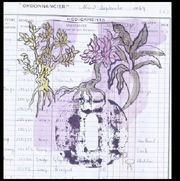|
Cool
sap circulates serenely in sedentary plants. The vegetable kingdom's claim to
existence is one long, last stand, with battles waged in volleys of chemical arms. Predators are rebuffed or endured, artfully indisposed in a slow war of attrition,
so that plants, given their turgid resistance, have come to be known as stoical
foes.
Predators are rebuffed or endured, artfully indisposed in a slow war of attrition,
so that plants, given their turgid resistance, have come to be known as stoical
foes.
Yet,
one summer, when a particularly ruinous infestation of beetles showed no sign
of abating; and the long-suffering victims of voracious appetite were chewed even
to despondency, one sorrowful flower sought to end the torment by turning its
petals away from the sun. It chose solar starvation as the only means to mute
the sickening sounds of rip-rip, snipping, and mandibular mastication.
| A
curious transformation was triggered when the wilting blossom changed orientation.
Its calyx, habitually shaded, dried and fused under direct exposure to the day's
rays. The form became a pointed pod like a beak, with a few petals sprouting from
the top. The effect, remarkably like the head of a parrot, caused the beetles
to flee the misshapen flower. Parrots delighted in eating such beetles, and these
had learned to keep well out of sight of those. The other plants could not fail
to notice the remarkable advantage that a mere change of attitude had conferred
upon one of their own. In very little time, most of the field had reversed from
perihelion. From the air the meadow appeared an encampment of parrots, all looking
west at sunrise, east at sunset.
The insects might have pierced the deception, had no a flock of genuine parrots
come to investigate whatever had so attracted their ilk.  The
birds regaled themselves on straggling beetles, and rather enjoyed the hide and
seek amongst false floral siblings. Close by, dwelled a tribe for whom parrot
plumes were sacred, ceremonial ornamentation. A hubbub broke out when reports
came in from the field of a strange communion between corolla and beating wing.
That night, in the moonlight, after dances had been performed to appease whichever
genies might be concerned, members of the tribe crept out to behead all the flowers,
reaping miraculous foliage with which to festoon their alters. The
birds regaled themselves on straggling beetles, and rather enjoyed the hide and
seek amongst false floral siblings. Close by, dwelled a tribe for whom parrot
plumes were sacred, ceremonial ornamentation. A hubbub broke out when reports
came in from the field of a strange communion between corolla and beating wing.
That night, in the moonlight, after dances had been performed to appease whichever
genies might be concerned, members of the tribe crept out to behead all the flowers,
reaping miraculous foliage with which to festoon their alters.
In
the aftermath, those crownless stalks offered easy
passage to the beetles. Once within, the insects could burrow down to soft roots.
The parrots soon discovered that by splitting the headless, hollow tubes they
could pick beetles out for a meal, as if from a straw. At the end of it all, the
field was mayhem. Exploded stalks ran radial about the drying roots in so many
parodies of the sun. The remaining plants abandoned the mimicry, turning fully
their petals to the hottest part of the sky. However difficult the previous straits,
nothing had been so bad as not to have a worse. ©
Copyright 2000 Longtales Ltd All Rights Reserved. |
|